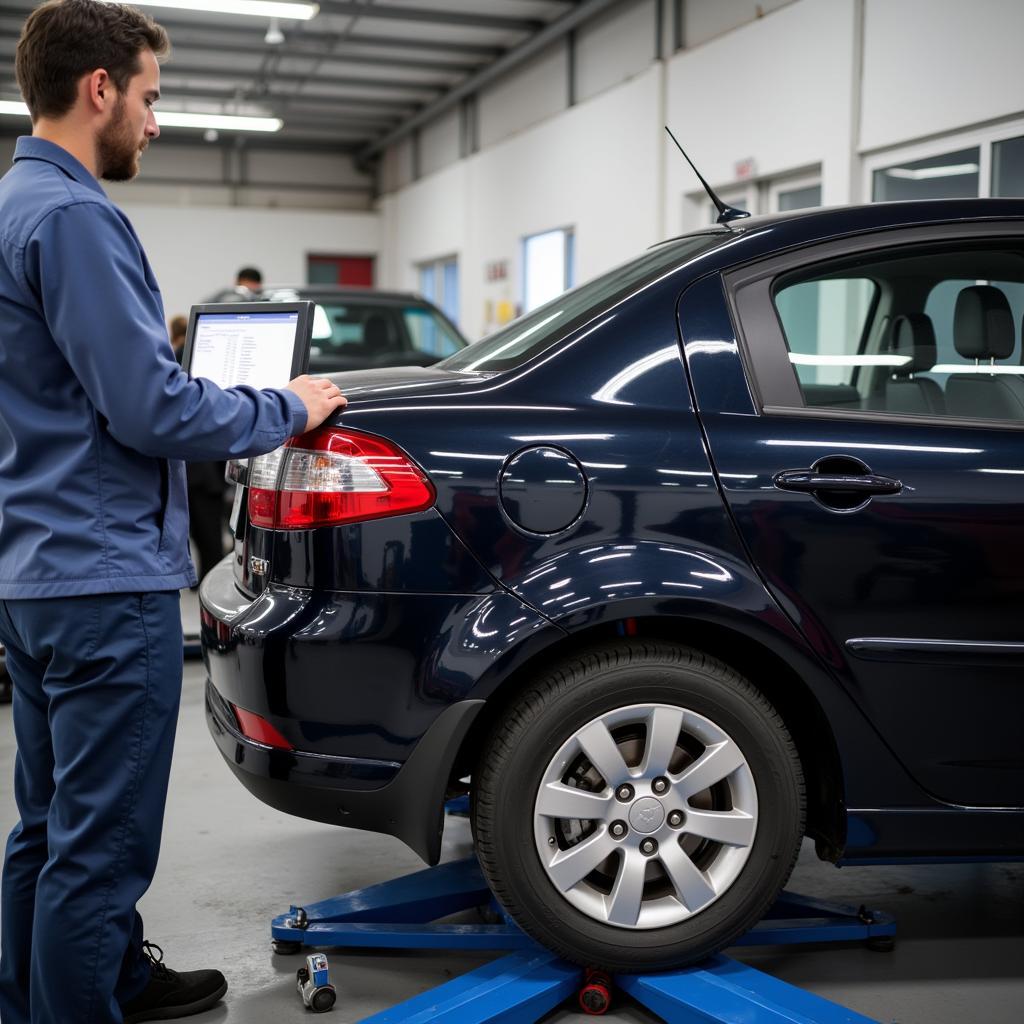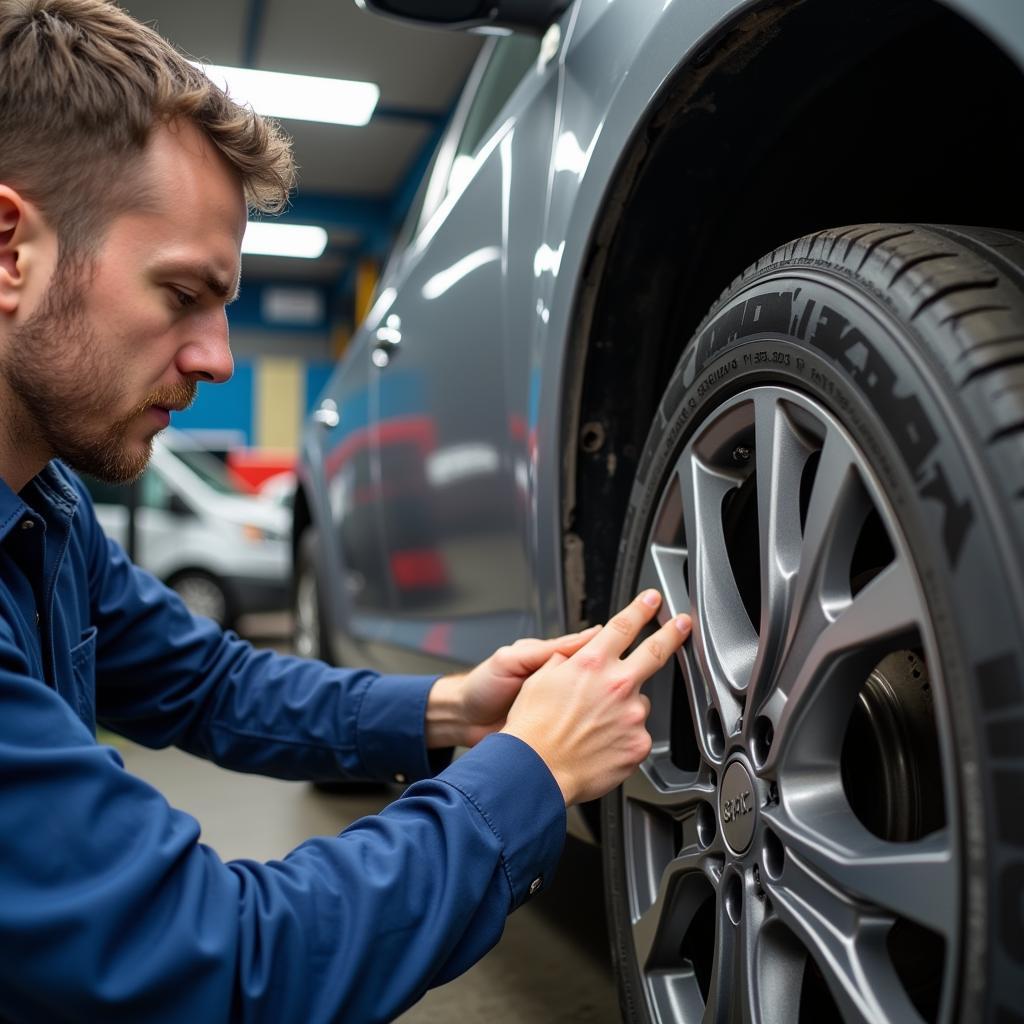Maintaining your car wheels isn’t just about aesthetics; it’s crucial for safety, performance, and longevity. A proper Car Wheel Maintenance Schedule will save you money in the long run and ensure a smoother, safer ride. This guide will provide you with everything you need to know to keep your wheels in top condition, whether you’re a car owner, mechanic, or automotive technician.
If you’re looking for a reliable and cost-effective 7-seater, check out this resource on 7 seater low maintenance car.
Understanding the Importance of a Car Wheel Maintenance Schedule
Why is a car wheel maintenance schedule so important? Ignoring your wheels can lead to several problems, including uneven tire wear, decreased fuel efficiency, and even dangerous driving conditions. A regular maintenance schedule allows you to catch potential issues early, preventing costly repairs down the road. It also helps maintain the resale value of your vehicle.
Key Components of Your Car Wheel Maintenance Schedule
Your car wheel maintenance schedule should encompass several key areas. This includes regular inspections, rotations, balancing, and alignment checks. Each of these plays a vital role in ensuring optimal wheel performance and safety.
Regular Inspections: The First Line of Defense
Inspecting your wheels regularly is the easiest and most effective way to prevent problems. Look for signs of damage like cracks, bulges, or embedded objects. Also, check the tire pressure regularly and ensure it matches the recommended pressure listed in your owner’s manual.
Tire Rotation: Even Wear for Extended Life
Tire rotation, a crucial part of car maintenance, ensures even wear across all four tires. Without regular rotation, tires can wear unevenly, leading to premature replacement. Generally, rotating your tires every 5,000 to 8,000 miles is recommended. You can learn more about car maintenance tyre rotation here.
Wheel Balancing: A Smooth and Comfortable Ride
Wheel balancing ensures that the weight is distributed evenly around the entire wheel and tire assembly. Imbalanced wheels can cause vibrations, which can be felt through the steering wheel and the entire vehicle. This not only affects ride comfort but can also lead to premature wear of suspension components.
Wheel Alignment: Keeping Your Car on Track
Proper wheel alignment ensures that your wheels are pointing in the correct direction, relative to each other and the road. Misalignment can cause your car to pull to one side, resulting in uneven tire wear and reduced fuel efficiency.
 Car undergoing wheel alignment check
Car undergoing wheel alignment check
For those interested in long-term car ownership, this article about car maintenance 20 years offers valuable insights.
Creating Your Personalized Car Wheel Maintenance Schedule
While general guidelines exist, the best car wheel maintenance schedule is one tailored to your specific vehicle and driving habits. Consult your owner’s manual for manufacturer recommendations and consider factors like driving conditions and mileage.
Factors Influencing Your Schedule
Several factors can influence how often you need to perform certain maintenance tasks. Driving on rough roads, for example, may necessitate more frequent inspections and rotations. Similarly, carrying heavy loads can impact tire wear and alignment.
What Car Manufacturer Has Lowest Maintenance Costs?
Are you looking for a vehicle known for its low maintenance costs? Check out this resource on what car manufacturer has lowest maintenance costs. It provides valuable information to help you make an informed decision.
Least Maintenance Cars of 2014: A Look Back
Interested in cars with a reputation for low maintenance? Explore this article on least maintenance cars 2014 for some historical perspective.
Conclusion
A consistent car wheel maintenance schedule is an essential part of responsible car ownership. By following the guidelines in this guide and addressing potential issues promptly, you can ensure the safety, performance, and longevity of your vehicle’s wheels and tires. For personalized assistance with your car maintenance needs, contact AutoTipPro at +1 (641) 206-8880 or visit our office at 500 N St Mary’s St, San Antonio, TX 78205, United States.
 Mechanic inspecting a car wheel for damage
Mechanic inspecting a car wheel for damage
FAQ
-
How often should I rotate my tires?
Generally, every 5,000 to 8,000 miles. -
What are the signs of misaligned wheels?
Pulling to one side, uneven tire wear, and a crooked steering wheel. -
How can I tell if my wheels are unbalanced?
Vibrations felt through the steering wheel or the car body. -
What should I look for during a wheel inspection?
Cracks, bulges, embedded objects, and uneven tire wear. -
Why is proper tire pressure important?
For safety, fuel efficiency, and even tire wear. -
How can I extend the life of my tires?
Regular rotations, proper inflation, and avoiding aggressive driving. -
What is the benefit of a car wheel maintenance schedule?
It prevents costly repairs, improves safety, and enhances vehicle performance.




Leave a Reply